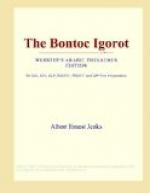From long continuance in the practice of head-hunting, many beliefs and superstitions arise to foster it, until in the minds of the people these beliefs are greater factors in its perpetuation than the original one of the debt of life. The possession of a head, with the accompanying honor, feasts, and good omens, seems in many cases to be of first importance rather than the avenging of a life.
The custom of head taking came with the Igorot to Luzon, a custom of their ancestors in some earlier home. The people of Bontoc, however, say that their god, Lumawig, taught them to go to war. When, a very long time ago, he lived in Bontoc, he asked them to accompany him on a war expedition to Lagod, the north country. They said they did not wish to go, but finally yielded to his urgings and followed him. On the return trip the men missed one of their companions, Gu-ma’-nub. Lumawig told them that Gu-ma’-nub had been killed by the people of the north. And thus their wars began — Gu-ma’-nub must be avenged. They have also a legend in regard to head taking: The Moon, a woman called “Kabigat,” was sitting one day making a copper pot, and one of the children of the man Chalchal, the Sun, came to watch her. She struck him with her molding paddle, cutting off his head. The Sun immediately appeared and placed the boy’s head back on his shoulders. Then the Sun said to the Moon: “Because you cut off my son’s head, the people of the Earth are cutting off each other’s heads, and will do so hereafter.”
With the Bontoc men the taking of heads is not the passion it seems to be with some of the people of Borneo. It, is, however, the almost invariable accompaniment of their interpueblo warfare. They invariably, too, take the heads of all killed on a head-hunting expedition. They have skulls of Spaniards, and also skulls of Igorot, secured when on expeditions of punishment or annihilation with the Spanish soldiers.
But the possession of a head is in no way a requisite to marriage. A head has no part in the ceremonies for palay fruitage and harvest, or in any of the numerous agricultural or health ceremonies of the year. It in no way affects a man’s wealth, and, so far as I have been able to learn, it in no way affects in their minds a man’s future existence. A beheaded man, far from being a slave, has special honor in the future state, but there seems to be none for the head taker. As shown by the Lumawig legend the debt of life is the primary cause of warfare in the minds of the people of Bontoc, and it is to-day a persistent cause. Moreover, since interpueblo warfare exists and head taking is its form, head-hunting is a necessity with an individual group of people in a state of nature. Without it a people could have no peace, and would be annihilated by some group which believed it a coward and an easy prey.




